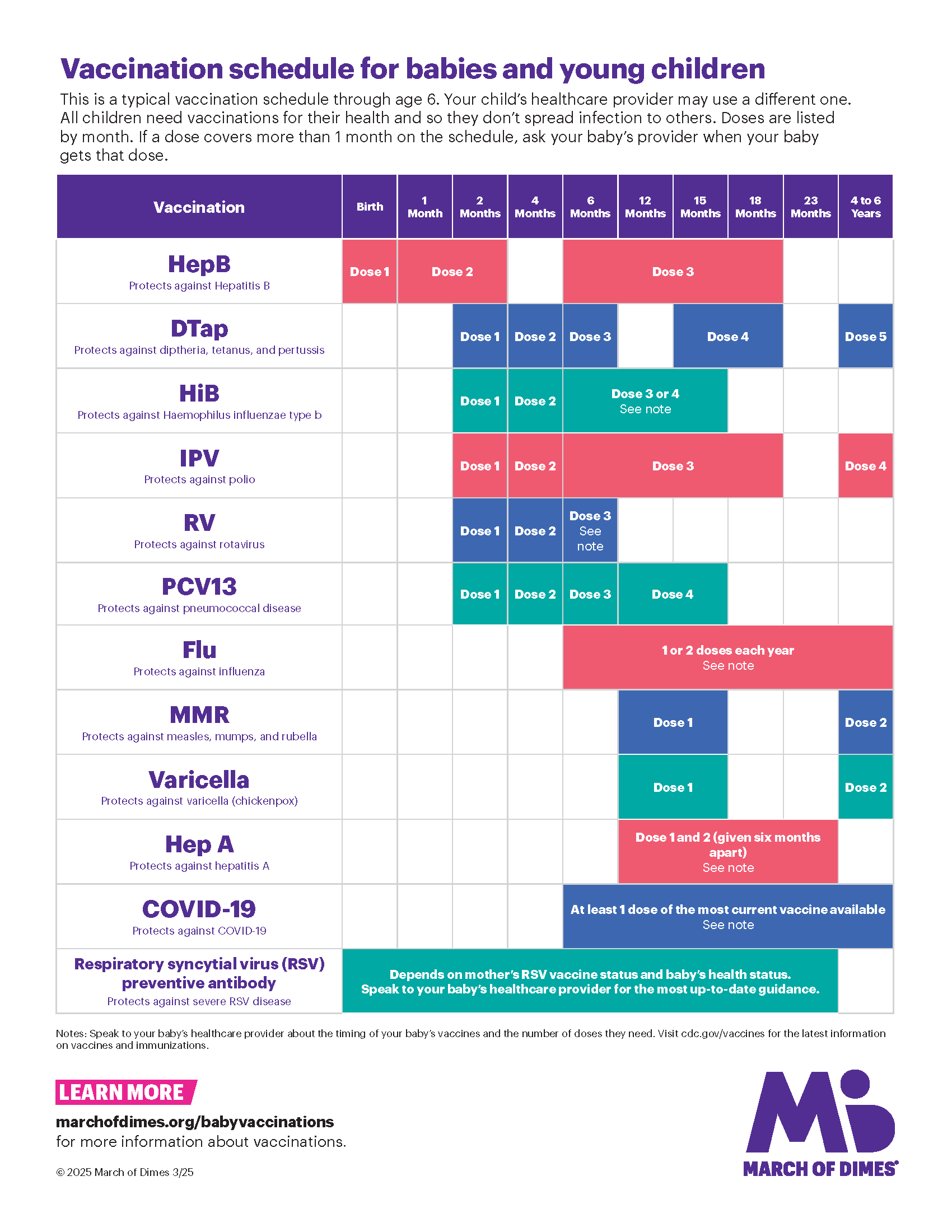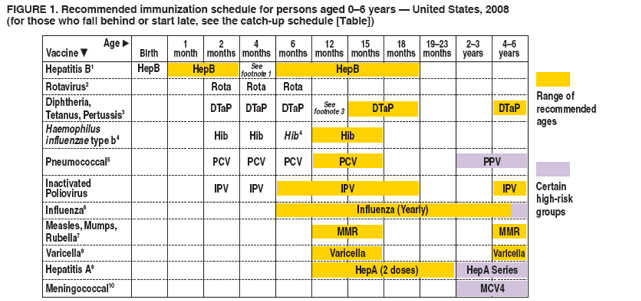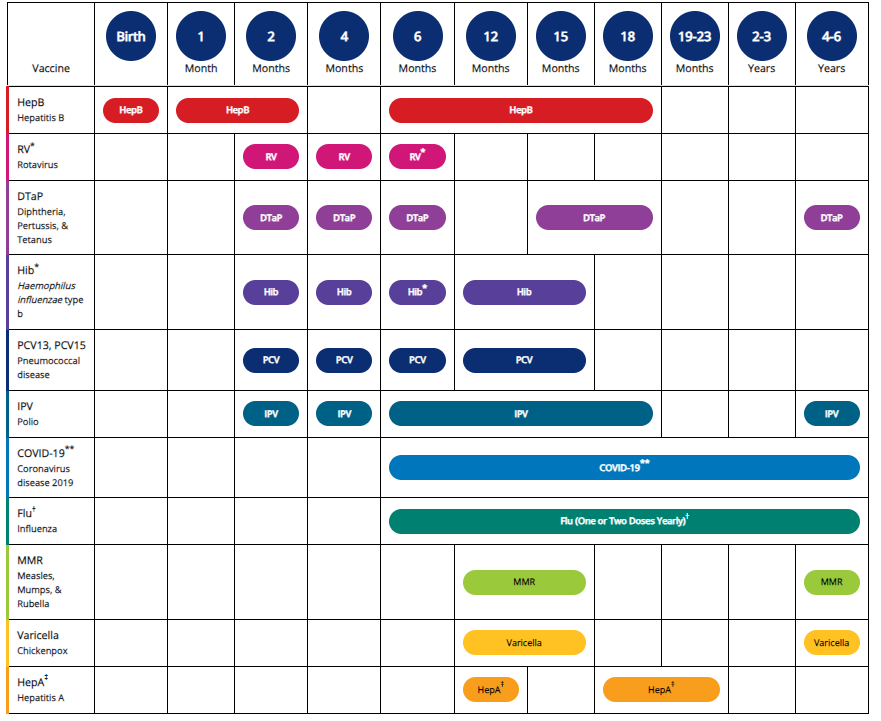Delayed Vaccine Schedule: Are you wondering if a delayed vaccine schedule might be the right choice for your child? With so much information—and misinformation—circulating, it’s easy to feel overwhelmed.
You might be questioning whether sticking to the standard schedule is necessary or if spacing out vaccines could be a safer option. This is a topic that stirs emotions, concerns, and plenty of debate among parents in the USA. But here’s the thing: your child’s health is too important to leave to chance.
By understanding what a delayed vaccine schedule really means, its potential risks, and its benefits, you can make a choice that feels right for your family. Keep reading, and we’ll break it all down in a way that’s simple, clear, and focused on what matters most—keeping your child safe and healthy.
Delayed Vaccine Schedule in USA

Credit: www.marchofdimes.org
What Is A Delayed Vaccine Schedule?
Vaccination is one of the most effective ways to protect your child from serious diseases. But not all parents follow the recommended vaccine schedule provided by the Centers for Disease Control and Prevention (CDC). Some opt for a delayed vaccine schedule, spacing out or postponing certain vaccines. But what exactly does this mean, and why do some families choose this approach?
A delayed vaccine schedule is when parents choose to give their child vaccines later than the recommended timeline. Instead of following the CDC’s guidelines, they may spread out shots over a longer period or skip some vaccines altogether. This approach is often based on personal beliefs or concerns about vaccine safety.
For example, instead of giving multiple vaccines during a single doctor visit, a parent might request to space them out. While this may feel like a safer option for some, it can leave children unprotected from preventable diseases for longer periods. It’s important to weigh the risks and benefits carefully before making this decision.
Why Do Parents Consider A Delayed Vaccine Schedule?
Some parents worry about overwhelming their child’s immune system by giving multiple vaccines at once. Others may have heard misinformation about vaccine safety and want to “play it safe.” These fears, while understandable, are often based on myths rather than scientific evidence.
One mom shared that she chose a delayed schedule because she felt uneasy after reading conflicting opinions online. But after her child caught whooping cough, she realized the risks of delaying were far greater than she had anticipated. Stories like this highlight the importance of making informed decisions.
What Does The Cdc Recommend?
The CDC recommends a specific vaccine schedule because it’s backed by extensive research. This schedule is designed to protect children when they are most vulnerable to certain diseases. Delaying vaccines can increase the risk of outbreaks, not just for your child but for the community as well.
For example, measles outbreaks in recent years have been linked to low vaccination rates. This shows how delays can have far-reaching consequences. Following the recommended schedule helps prevent such outbreaks and keeps everyone safer.
Is A Delayed Vaccine Schedule Safe?
Research shows no benefits to delaying vaccines. On the contrary, it can put your child at greater risk of catching preventable diseases. Vaccines are tested rigorously to ensure they are safe and effective when given according to the recommended timeline.
If you have concerns about vaccines, it’s a good idea to talk to your child’s doctor. They can answer your questions and help you feel confident about the decisions you’re making for your child’s health. Remember, delaying might feel like a cautious choice, but it could actually increase risks.
Why Parents Choose Delayed Schedules
In the United States, some parents choose to delay their child’s vaccination schedule. This decision often stems from personal beliefs or concerns about standard vaccine timelines. Understanding their reasons can provide insight into this growing trend.
Concerns About Vaccine Safety
Many parents worry about the safety of vaccines given early in life. They fear side effects or potential long-term health risks. Stories of adverse reactions often amplify these concerns. Parents may think spreading vaccines out gives their child’s body more time to adjust.
For some, the number of vaccines given at once feels overwhelming. They believe a delayed schedule reduces the strain on a young immune system. These worries, while common, are not always based on scientific evidence.
Influence Of Misinformation
Misinformation about vaccines is widespread online and in social circles. False claims about vaccines causing autism or other serious conditions create fear. Parents who lack access to verified information may trust these unproven theories.
Social media often amplifies these concerns, spreading fear quickly. Some parents feel confused by conflicting information, leading them to delay or avoid vaccines. Trusted sources, like healthcare professionals, are key to combating misinformation.
Desire For A Customized Approach
Parents want to make the best decisions for their child. A delayed schedule feels more personalized to some families. They think tailoring vaccine timing shows more care for their child’s needs.
Some parents believe their child may have unique health factors to consider. They feel a one-size-fits-all approach does not address individual differences. This desire for control often drives their decision-making process.
Health Risks Of Delaying Vaccines
Delaying vaccines in the USA can increase the risk of preventable diseases like measles and whooping cough. Gaps in vaccination schedules leave individuals and communities vulnerable to outbreaks. Timely immunizations protect public health and reduce severe complications.
Choosing to delay vaccines can increase health risks for children and adults. Vaccines protect individuals and communities from serious diseases. Delays create gaps in protection, leaving people vulnerable to infections. These gaps can lead to preventable health issues and outbreaks. Below, we explore the risks associated with delayed vaccine schedules.
Increased Vulnerability To Diseases
Delaying vaccines leaves individuals unprotected for longer periods. Diseases like measles, whooping cough, and polio thrive in unvaccinated populations. Young children are especially at risk due to their weaker immune systems. Early vaccination is crucial to prevent severe complications. Without timely protection, the chance of infection increases significantly.
Impact On Herd Immunity
Vaccines not only protect individuals but also the community. Herd immunity occurs when enough people are vaccinated. This reduces the spread of diseases, protecting vulnerable individuals. Delaying vaccines weakens herd immunity, allowing diseases to spread more easily. This puts newborns, the elderly, and immunocompromised individuals at greater risk.
Outbreaks And Public Health Concerns
Delaying vaccines can lead to outbreaks of preventable diseases. Diseases like measles can spread rapidly in under-vaccinated areas. Outbreaks strain healthcare systems and disrupt daily life. Public health officials often need to respond with costly measures. Vaccinating on schedule helps prevent these unnecessary challenges.
“`

Credit: www.cdc.gov
Potential Benefits Of Delayed Schedules
The concept of delayed vaccine schedules is growing in popularity in the USA. Some parents believe spacing out vaccines offers potential benefits for their children. While it remains a debated topic, certain perceived advantages stand out. These include reduced anxiety, individualized care, and a lower risk of side effects. Below, we explore these potential benefits in detail.
Reduced Anxiety For Parents
Many parents feel overwhelmed by the standard vaccine schedule. The number of shots in a single visit can cause stress. A delayed schedule can ease this anxiety by reducing the number of vaccines given at once. This approach allows parents to feel more in control of their child’s healthcare. It also provides time to research and understand each vaccine fully.
Focus On Individualized Care
A delayed schedule may offer more tailored care for each child. Not all children respond to vaccines in the same way. Spacing out vaccines allows healthcare providers to monitor individual reactions more closely. This can be especially helpful for children with health conditions or sensitivities. Parents can also address specific concerns during each visit, ensuring personalized attention.
Perceived Lower Risk Of Side Effects
Some parents worry about the side effects of vaccines given together. A delayed schedule spreads out the doses, which may ease these concerns. Parents believe this approach reduces the likelihood of adverse reactions. It also provides more time to observe and address any side effects. This perceived benefit brings peace of mind to many families.
Expert Opinions On Vaccine Timing
Parents in the USA often debate the timing of childhood vaccines. Some opt for delayed schedules, while others follow standard recommendations. Expert opinions on vaccine timing can help families make informed decisions. Pediatricians, CDC, WHO, and immunologists offer critical insights on this topic.
Pediatricians’ Recommendations
Pediatricians emphasize the importance of timely vaccinations. They believe delays can expose children to preventable diseases. Many pediatricians follow the American Academy of Pediatrics’ guidelines. These schedules are designed to protect children during vulnerable stages. Pediatricians also consider individual health factors when advising parents.
Cdc And Who Guidelines
The Centers for Disease Control and Prevention (CDC) and World Health Organization (WHO) recommend strict vaccine schedules. These schedules are based on extensive research and global disease patterns. They aim to protect communities from outbreaks and ensure herd immunity. Both organizations stress the risks of vaccine delays for public health.
Insights From Immunologists
Immunologists study how vaccines interact with the immune system. They highlight the importance of early vaccines for developing strong immunity. Delays can reduce a vaccine’s effectiveness in certain cases. Immunologists also warn that delayed schedules may leave gaps in disease protection. Their research supports standard timing to maximize health benefits.

Credit: www.healthvermont.gov
Impact On Children’s Immune Systems
The decision to follow a delayed vaccine schedule has sparked debates about its potential effects on children’s immune systems. While some parents believe delaying vaccines is safer, others worry it may leave their children vulnerable. But how does this choice impact the immune system, especially during those critical early years of development?
How Vaccines Work In Early Development
Vaccines train your child’s immune system to recognize and fight harmful pathogens. During early development, the immune system is like a blank slate, learning how to protect the body. Vaccines provide this training without exposing your child to the actual diseases.
In those first months, your baby is highly vulnerable to infections because their immune system is still building its defenses. Vaccines given on the recommended schedule work alongside this natural development. They ensure your child’s body is ready to fight dangerous illnesses like measles, whooping cough, and polio.
Delaying vaccines means missing this critical window for protection. Instead of being prepared, your child’s immune system may face severe challenges if exposed to diseases early on. This can lead to unnecessary risks that could have been avoided.
Effects Of Delayed Exposure To Pathogens
When vaccines are delayed, your child remains unprotected from diseases for a longer time. This leaves them vulnerable during daycare, school, or even visits to the park, where they can be exposed to common germs. Young children, especially infants, can experience more severe complications from illnesses compared to older kids or adults.
For example, delaying the DTaP vaccine increases the risk of contracting whooping cough, which can cause life-threatening breathing problems in babies. The immune system may eventually learn to fight the illness, but the process can be painful and dangerous.
Also, delayed exposure to vaccines might affect herd immunity. Your choice impacts not only your child but also those around them, especially newborns or individuals with weakened immune systems. Are you comfortable with the idea that delaying your child’s vaccines could put others at risk?
Vaccines are a cornerstone of public health for a reason. Following a delayed schedule without medical advice might leave your child’s immune system unprepared and vulnerable. Always consult your pediatrician to make informed decisions about your child’s health.
Social And Ethical Considerations
The delayed vaccine schedule is a topic that sparks various social and ethical debates. It involves balancing personal choices with broader community responsibilities. Parents who delay vaccinations often face questions about their decisions. These questions explore how those choices impact public health and ethical standards. This section discusses the societal and moral dimensions of delayed vaccination schedules in the USA.
Responsibility To The Community
Vaccination helps protect vulnerable groups like infants, elderly, and those with weak immunity. Delaying vaccines can weaken herd immunity, increasing risks for these groups. Communities depend on widespread vaccination to prevent outbreaks. Choosing to delay vaccines raises concerns about putting others at risk.
Public health systems rely on collective action to maintain safety. Individual choices that affect the group can have larger consequences. Parents delaying vaccines may unintentionally harm the community. Ethical responsibility extends beyond personal interests to the well-being of society.
Ethical Dilemmas In Parental Choice
Parents often delay vaccines due to concerns about side effects or safety. These decisions are deeply personal and tied to their beliefs. Yet, ethical dilemmas arise when personal choices conflict with public health goals. Balancing individual rights with societal needs becomes challenging.
Some argue that delaying vaccines prioritizes personal freedom over shared health benefits. Others believe parents should have the right to decide for their children. This creates a moral conflict between autonomy and community welfare.
Understanding these ethical dilemmas requires open dialogue and empathy. Both sides hold valid concerns about health, safety, and ethics.
Weighing The Risks And Benefits
Delayed vaccine schedules have become a topic of debate in the USA. Parents often weigh the risks and benefits before deciding on vaccination timing. While vaccines protect against serious diseases, some families worry about side effects or overwhelming the immune system. Understanding the risks and benefits is crucial for making informed decisions.
Balancing Parental Concerns With Public Health
Parents want to protect their children and ensure their safety. Concerns about vaccine timing often stem from fear of adverse reactions. Public health experts emphasize the importance of timely vaccinations. Delaying schedules can leave children vulnerable to preventable diseases. It may also impact herd immunity, which protects the community.
Finding balance between personal concerns and public health is challenging. Open communication with healthcare providers is key. Pediatricians can address questions, dispel myths, and provide evidence-based advice. Understanding both perspectives helps parents make decisions that align with their values.
Making Informed Decisions
Parents need accurate information to make informed vaccine choices. Reliable sources like the CDC or WHO can clarify vaccine benefits and risks. Healthcare providers are also valuable resources for personalized guidance. Researching vaccine safety and effectiveness builds confidence in the decision-making process.
Creating a tailored vaccine schedule may seem appealing. Yet, it’s essential to understand the risks of delaying vaccines. Diseases like measles and whooping cough can spread quickly without timely protection. Learning about the science behind vaccines can help parents feel secure in their choices.
Frequently Asked Questions
Can You Do A Delayed Vaccine Schedule?
Yes, we can accommodate a delayed vaccine schedule. Consult with your healthcare provider to ensure it meets safety guidelines.
What Happens If Vaccination Is Delayed?
Delaying vaccination increases the risk of disease outbreaks and weakens immunity against preventable illnesses. Stay on schedule for protection.
Are There Benefits To Delaying Baby Vaccinations?
Delaying baby vaccinations increases the risk of preventable diseases. Timely vaccines protect babies from serious illnesses and complications effectively.
Can I Choose Not To Vaccinate My Baby?
Yes, you can choose not to vaccinate your baby. However, vaccines protect against serious diseases and are highly recommended by health experts. Always consult a pediatrician before making decisions.
Conclusion
Choosing a delayed vaccine schedule is a personal decision for many families. It’s important to weigh the benefits and risks carefully. Always consult your doctor to make informed choices for your child’s health. Staying informed about vaccines helps ensure your child’s safety and well-being.
Every family’s situation is unique, so choose what works best for you. Reliable information and open communication with healthcare providers are key. Prioritize your child’s health by staying proactive and asking questions. Your child’s future depends on the decisions you make today.
Remember, informed choices lead to peace of mind and better outcomes.



